#exceptionalism of USA
Note
please consider "Kiss me, Son of God" as a Homelander song, cause I heard it today and felt like, Inspired
Anonymous friend, I say this with complete sincerity : this is perfection ! The fiddle paired with the tack piano makes for such a jubilantly, quaint ( almost aggressively so ) ragtime sound. That is nothing to say of the lyrics !
I look like Jesus, so they say
But Mr. Jesus is very far away
Now you're the only one here who can tell me if it's true
That you love me and I love me
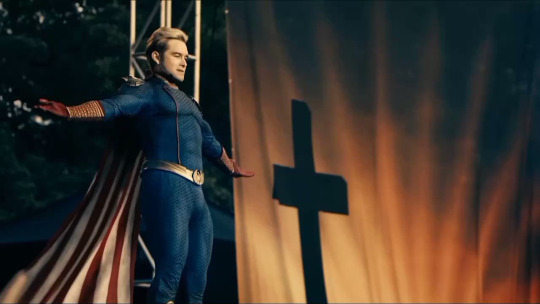
Will be adding this gem to my Homelander playlist promptly. Thank you for sharing, I too am now inspired.
#It isn't enough for a song to simply have 'America' in the title to qualify as a Homelander song#it has to *feel* like him#and this song absolutely does#At his core I personally feel that Homelander's energy is that of vintage Disneyland's Frontierland and Mainstreet USA.#cartoonish caricature of American exceptionalism made from plastic and painted plywood#Trashtalk#Anonymous#Homelander
61 notes
·
View notes
Text
African countries have NO drinkable water at all!!
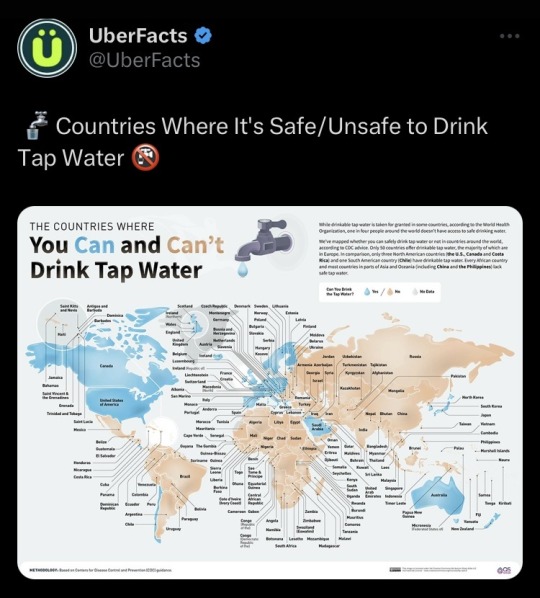

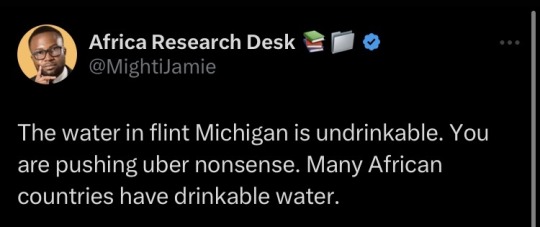


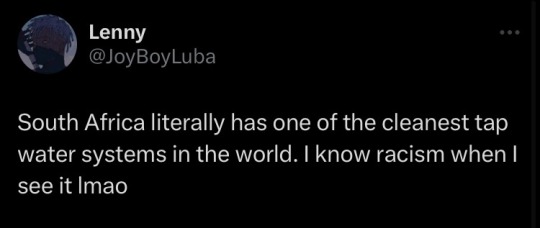
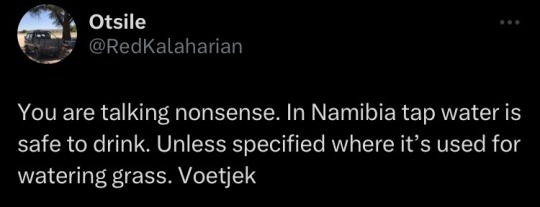
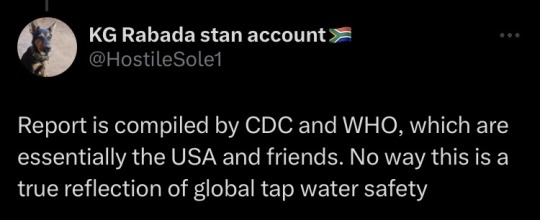


Racism is so exhausting…
#American exceptionalism#america#USA#Africa#African#South Africa#racism#colonialism#radfem#black radfem#radical feminism#black#flint#michigan
21 notes
·
View notes
Text

hey wonder what country we're in
#chicago#illinois#united states#american#usa#lawando's#american flag#american exceptionalism#jesus fuckin christ#calm down lawando#this is an auto repair place btw#not that you'd be able to tell#twitch streamer#geoguessr stream#screenshot
7 notes
·
View notes
Text
Disco Elysium: You are in a world on the edge of the end. The revolution has been fought and lost. There is a hole in existence itself that is getting bigger. If you tune in, you can hear the sigh of creatures as they fade into extinction. They hate you for what you've done. They love you for having tried. There is nothing you can do. There is still work to do. You are all going to die. You have to find the truth behind one man's death. It is pointless, and it is necessary.
Some shit-for-brains take on Tumblr.com: Its so stupid how Americans think they can relate to this story lol cultural appropriation much?
#disco elysium#I saw the post this is mostly about forever ago and wisely decided not to engage#but I saw similar shit re: CSM themes on gun violence and how *stupid* it is to apply that to USAmericans and it made me mad all over again#lol#notice this is NOT saying *this is a purely american story* because ...fucking obviously it isn't lol just that it IS extremely relevant#which i think is why it's been received so highly#I think being able to say *this is a story that is applicable to multiple cultures and countries in the modern day including USA* is -#- vital for tearing down the American Exceptionalism myth that is hurting the country sooo badly
22 notes
·
View notes
Text
There’s something to be said about how gringo exceptionalism is taken to a point that they make their exceptionalism into exceptional.
thinking about my classmates saying that the USA was especially racist w/o being able to tell them that they would have a heart attack in Latin America
#like do they know most enslaved people came to LatAm and the Caribbean?#Painting the USA as exceptionally diabolic is something i once heard said as the anti imperialism of idiots#^ idk if it was an original right winger but a famous syrian leftist did write that in an article#About syrian war crimes denialism
2 notes
·
View notes
Text
"American democracy is dying. There are plenty of medicines that would cure it. Unfortunately, our political dysfunction means we’re choosing not to use them, and as time passes, fewer treatments become available to us, even though the disease is becoming terminal. No major prodemocracy reforms have passed Congress. No key political figures who tried to overturn an American election have faced real accountability. The president who orchestrated the greatest threat to our democracy in modern times is free to run for reelection, and may well return to office.
Our current situation started with a botched diagnosis. When Trump first rose to political prominence, much of the American political class reacted with amusement, seeing him as a sideshow. Even if he won, they thought, he’d tweet like a populist firebrand while governing like a Romney Republican, constrained by the system. But for those who had watched Trump-like authoritarian strongmen rise in Turkey, India, Hungary, Poland, the Philippines, Sri Lanka, Thailand, and Venezuela, Trump was never entertaining. He was ominously familiar.
At issue was a classic frame-of-reference problem. America’s political culture is astonishingly insular. Turn on cable news and it’s all America, all the time. Other countries occasionally make cameos, but the story is still about us. (Poland is discussed if Air Force One goes to Warsaw; Iran flits into view only in relation to Washington’s nuclear diplomacy; Madagascar appears only in cartoon form, mostly featuring talking animals that don’t actually live there.) Our self-obsession means that whenever authoritarianism rises abroad, it’s mentioned briefly, if at all. Have you ever spotted a breathless octobox of talking heads on CNN or Fox News debating the death of democracy in Turkey, Sri Lanka, or the Philippines?
That’s why most American pundits and journalists used an “outsider comes to Washington” framework to process Trump’s campaign and his presidency, when they should have been fitting every fresh fact into an “authoritarian populist” framework or a “democratic death spiral” framework. While debates raged over tax cuts and offensive tweets, the biggest story was often obscured: The system itself was at risk.
Even today, too many think of Trump more as Sarah Palin in 2012 rather than Viktor Orbán in 2022. They wrongly believe that the authoritarian threat is over and that January 6 was an isolated event from our past, rather than a mild preview of our future. That misreading is provoking an underreaction from the political establishment. And the worst may be yet to come.
The basic problem is that one of the two major parties in the U.S.—the Trumpified Republican Party—has become authoritarian to its core. Consequently, there are two main ways to protect American democracy. The first is to reform the GOP, so that it’s again a conservative, but not authoritarian, party (à la John McCain’s or Mitt Romney’s Republican Party). The second is to perpetually block authoritarian Republicans from wielding power. But to do that, Democrats need to win every election. When you’re facing off against an authoritarian political movement, each election is an existential threat to democracy. Eventually, the authoritarian party will win...
That leaves American democracy with a bleak prognosis. Barring an electoral wipeout of Republicans in 2022 (which looks extremely unlikely), the idea that the party will suddenly abandon its anti-democracy positioning is a delusion.
Prodemocracy voters now have only one way forward: Block the authoritarian party from power, elect prodemocracy politicians in sufficient numbers, and then insist that they produce lasting democratic reforms.
The wish list from several democracy experts I spoke with is long, and includes passing the Electoral Count Act, creating a constitutional right to vote, reforming districting so more elections are competitive, establishing a nonpartisan national election-management body, electing the president via popular vote, reducing the gap in representation between states like California and Wyoming, introducing some level of proportional representation or multimember districts, aggressively regulating campaign spending and the role of money in politics, and enforcing an upper age limit for Supreme Court justices. But virtually all of those ideas are currently political fantasies."
#this article is kinda annoying in a very The Atlantic sort of way#but the central point is the one i've been trying to make all along which is that our own american exceptionalism will be the death of us#usa continues having an extremely normal one#politics#news
16 notes
·
View notes
Text
I might be wrong but is there some link abt American society and their obsession with serial killers
Wish I could do one of those popular posts that's like: tag your country and if they ever made a movie abt a serial killer
#like in poland we have 0 mainstream serial killer movies#there are true crime youtubers but i dont think they are as popular as they are in usa?#sth sth american individual exceptionalism sth sth those serial killer scares that middle class qhite suburban americans were obsessed with
12 notes
·
View notes
Text
"America is the last, best hope of Earth"
-Boris Johnson, Fmr UK PM

Self-Evident Hard Truths
AMERICAN
EXCEPTIONALISM
"So help us God."
#abraham lincoln#potus#joe biden#America#american#united states#united states of america#USA#U.S.A.#Boris Johnson#uk#united kingdom#Britian#British#essays#Monday#Mondays#All American#american exceptionalism#Captain America#Good Morning
1 note
·
View note
Text
We Are No Strangers to Human Suffering, but We’ve Seen Nothing Like the Siege of Gaza
Dec. 11, 2023 | Source: New York Times Op-ed
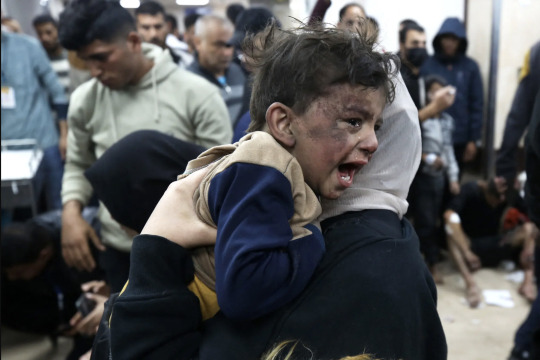
By Michelle Nunn (CARE USA), Tjada D’Oyen McKenna (Mercy Corps), Jan Egeland (Norwegian Refugee Council), Abby Maxman (Oxfam America), Jeremy Konyndyk (Refugees International), and Janti Soeripto (Save the Children U.S.)
We are no strangers to human suffering — to conflict, to natural disasters, to some of the world’s largest and gravest catastrophes. We were there when fighting erupted in Khartoum, Sudan. As bombs rained down on Ukraine. When earthquakes leveled southern Turkey and northern Syria. As the Horn of Africa faced its worst drought in years. The list goes on.
But as the leaders of some of the world’s largest global humanitarian organizations, we have seen nothing like the siege of Gaza. In the more than two months since the horrifying attack on Israel that killed more than 1,200 people and resulted in some 240 abductions, about 18,000 Gazans — including more than 7,500 children — have been killed, according to the Gazan health ministry. More children have been reported killed in this conflict than in all major global conflicts combined last year.
The atrocities committed by Hamas on Oct. 7 were unconscionable and depraved, and the taking and holding of hostages is abhorrent. The calls for their release are urgent and justified. But the right to self-defense does not and cannot require unleashing this humanitarian nightmare on millions of civilians. It is not a path to accountability, healing or peace. In no other war we can think of in this century have civilians been so trapped, without any avenue or option to escape to save themselves and their children.

Most of our organizations have been operating in Gaza for decades. But we can do nothing remotely adequate to address the level of suffering there without an immediate and complete cease-fire and an end to the siege. The aerial bombardments have rendered our jobs impossible. The withholding of water, fuel, food and other basic goods has created an enormous scale of need that aid alone cannot offset.
Global leaders — and especially the United States government — must understand that we cannot save lives under these conditions. A significant change in approach from the U.S. government is needed today to pull Gaza back from this abyss.
For a start, the Biden administration must stop its diplomatic interference at the United Nations, blocking calls for a cease-fire.
Since the pause in fighting ended, we are again witnessing an exceptionally high level of bombardment, and at increasing ferocity. The few areas left in Gaza that are untouched by bombardment are shrinking by the hour, forcing more and more civilians to seek safety that does not exist. Over 80 percent of 2.3 million Gazans are now displaced. The newest Israeli offensive is now forcing them to cluster on a tiny sliver of land.
The bombardment is not the only thing brutally cutting lives short. The siege of — and blockades surrounding — Gaza have led to a critical food scarcity, cutoffs of medical supplies and electricity, and a lack of clean water. There is barely any medical care to be found in the enclave and few medications. Surgeons are working by the light of their mobile phones, without anesthetics. They are using dishcloths as bandages. The risk of waves of waterborne and infectious disease will only grow in the increasingly overcrowded living conditions of the displaced.
One of our colleagues in Gaza recently described their struggle to feed an orphaned infant who had been rescued from the rubble of an airstrike. The baby had not eaten for days after her mother’s death. Colleagues could only scrounge up powdered milk — not formula, not breast milk, and not a nutritionally suitable infant food — to help stave off her starvation.
Before the war, hundreds of truckloads of aid were needed each day to support Gazans’ daily existence. Only a trickle of that required aid has made it into Gaza in the two months since the war began. But even if more were allowed in, our work in Gaza is dependent on ensuring our teams can move safely to set up warehouses, shelters, health clinics, schools, and water, sanitation and hygiene infrastructure.
Today our staff members are not safe. They tell us they’re making the daily choice of staying with their families in one place so that they can die together or go out to seek water and food.
Among leaders in Washington, there is constant talk about preparing for the “day after.” But if this relentless bombardment and siege continue, there will be no “day after” for Gaza. It will be too late. Hundreds of thousands of lives hang in the balance today.
So far, American diplomacy in this war has not delivered on the goals President Biden has conveyed: protection of innocent civilians, adherence to humanitarian law, more aid delivery. To stop Gaza’s apocalyptic free fall, the Biden administration must take tangible measures, as it does in other conflicts, to up the ante with all parties to the conflict and bordering countries.
Secretary of State Antony Blinken once said of the war in Ukraine that the targeting of heat, water and electricity was a “brutalization of Ukraine’s people” and “barbaric.” The Biden administration should acknowledge that the same holds true in Gaza. While it has announced measures to deter violence against Palestinian civilians in the West Bank, Mr. Blinken and his colleagues should apply similar pressure to stop violence against civilians in Gaza, too.
The harrowing events unfolding before us are shaping a global narrative that, if unchanged, will reveal a legacy of indifference in the face of unspeakable suffering, bias in the application of the laws of conflict and impunity for actors that violate international humanitarian law.
The U.S. government must act now — and fight for humanity.
Ms. Nunn is the president and chief executive of CARE USA. Ms. McKenna is the chief executive of Mercy Corps. Mr. Egeland is the secretary general of the Norwegian Refugee Council. Ms. Maxman is the president and chief executive of Oxfam America. Mr. Konyndyk is the president of Refugees International. Ms. Soeripto is the president and chief executive of Save the Children U.S.
#gaza#gaza strip#world news#news#middle east#israel#palestine#news on gaza#ceasefire#israel palestine conflict#human rights#humanitarian crisis#international law#PLEASE TAKE A MOMENT TO READ#DONT LOOK AWAY#current events#social justice#ceasefire now#end occupation#palestinians
865 notes
·
View notes
Text
https://monthlyreview.org/2021/07/01/can-the-chinese-diaspora-speak/
#china#anti imperialism#usa#neocolonialism#chinese diaspora#diaspora#politics#american exceptionalism#communism#education#immigration#academia
0 notes
Quote
In recent weeks, America has reached new depths in its long doom spiral of gun worship. The urgency of disentangling guns from our sense of individual and national identity has never been more clear. We can safely keep our exceptionalist myths, our cowboy archetypes, our notions of gun-toting good guys holding evil at bay, only as long as we also recognize them as nostalgic delusions at odds with the reality of what it means to live in community with others.
Writer Francisco Cantú in an opinion piece at the New York Times.
1 note
·
View note
Text
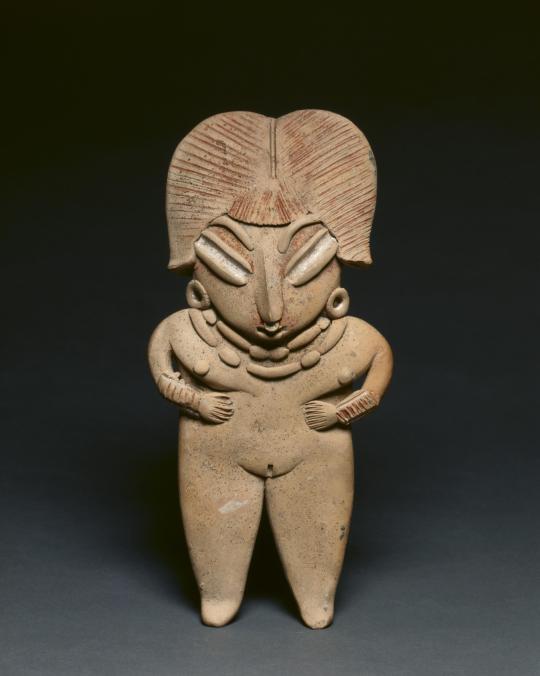
Unknown, Mexico, Guanajuato or Michoacán, Chupícuaro
Female Figurine
c. 400–100 BC
This carefully crafted figurine is extraordinarily large and exceptionally well preserved.
ceramic, pigment
Overall: 22.5 x 10.5 cm (8 7/8 x 4 1/8 in.)
The Cleveland Museum of Art
Cleveland, Ohio, USA
359 notes
·
View notes
Note
Opinions on owning pet parrots? I'm doing a degree in animal welfare and have pretty much come to the conclusion that the smaller species are fine if you can provide what they need but the larger birds like the greys, outside of being rescues, shouldn't be pets at all.
Okaaaaaaaay so time to make everyone mad at me again I guess
parrots have been human companion animals for longer than Judaism has been around, so, I don't think we can just say "it's wrong" and force everyone to stop doing a thing that's been done for that long. Like, this isn't a human randomly taking home a tiger, this is a long going process with many species of parrots now being near-domesticated in the strictest sense of the term
Parrot ownership is in fact ancient in many "tropical" areas and the idea that it's a new thing is... white supremacy! what a shock!
in the United States (I am not talking about other countries, just my own), literally no companion parrots are wild caught anymore. They're bred. Bred as companions. If we were to outlaw larger parrot ownership, many birds would be without a home, and that's morally reprehensible
in fact, the kind of backlash against parrot ownership that's risen up in the past decade has directly led to a shelter crisis. most shelters are overfilled and overstressed, which is a *lot* worse for the birds in many cases than home ownership
parrots are pets that have extraordinarily high care needs. They are not good pets for everyone. but no pet is! Every single companion animal has its pluses and downsides, and many of them have many more downsides than pluses. Doesn't mean they shouldn't have a home.
There are some people who are actually able to take care of companion parrots, adequately, in their homes. First of all, we've learned a lot in the past few decades. Second of all, there are lifestyles that work well with even larger parrots and their needs.
So, while the number of human beings on this planet who can adequately take care of large parrots is extremely small, it is not zero. Which means if someone thinks they can take care of a bird well, and has the space and resources and time, then they should be allowed to, if that's what they wish
Because birds in the USA are bred as companions, the vast majority of said parrots would be unhappy in any situation that doesn't involve close contact with humans. Admittedly, all my parrots are "small" (whatever that means), but I know for a fact that if you took them away from our home they would be significantly worse off, because they're bonded to us. That's how this whole flocking thing works
Also, our most recent rescues, who had been stuck in a shelter for 15 years, are definitely happier now getting more individual attention and space. Shelters are supposed to be temporary places for most birds, not permanent homes, because they can't get the adequate level of care and attention that they need.
also, I'll point out that being pets has allowed many parrot species to have thriving populations that are not threatened by climate change, which is something to their benefit. given. you know. climate change. not that pet ownership is conservation, but, it's not that far removed from it - the axolotl population owes a lot to both pet ownership and zoo captivity, for example.
like, it's a spectrum, right? And it doesn't really go along with size, at the end of the day. There are tons of extremely neurotic and high needs small parrots, and many larger ones that are exceptionally chill. So while the vast majority of humans on this planet should not have a parrot, that's not all of them; and while the number that can handle higher maintenance ones is even smaller, its not zero. And I think, given the fact that we have all of these captive bred birds in the states at least, it's not a good idea to tell people that there is no way to ethically practice husbandry with them.
and I'm not the kind of person who assumes I know everything about someone's life in order to tell them "no you shouldn't bring home that cockatoo", so I'm not going to. In fact, I give everyone on the internet the benefit of the doubt if they have a parrot unless a) that parrot shows signs of distress (like plucking) or b) there is clearly something wrong going on (like someone's smoking weed around their bird)
so, no, there's no commonly kept (and thus domestically captive bred) bird I think is a bad pet for every single human on the planet. And it's not my business whether a particular individual should or should not have a particular bird.
631 notes
·
View notes
Text
okay can i just GO OFF about how angry the Trump-endorsed "God Bless the USA" Bible makes me?

like first of all, one of the most privileged and un-Christlike human beings on the planet using their face to promote a Bible is just... EWWW. and during Holy Week, no less. and ever so conveniently when he has to pay legal bills.
second, by adding political documents to the Bible, they are essentially trying to lump them in with scripture, which is literal blasphemy.
"You must neither add anything to what I command you nor take away anything from it, but keep the commandments of the Lord your God with which I am charging you." - Deuteronomy 4:2 (NRSVUE)
third, this whole thing just screams "American exceptionalism." God sent Their son to earth because "God so loved the WORLD," not because "God so loved the USA." by trying to turn patriotism into something that must be one and the same with faith, you are making an idol out of America, and i'm pretty sure God had a whole-ass commandment about not making idols.
look, it shouldn't matter if you're a hardcore conservative evangelical, or a queer-affirming progressive left-wing Christian like me. or even if you're not Christian at all. this should absolutely disgust you.
86 notes
·
View notes
Text
There's just a vast gulf of difference to it. When your wealthy and powerful character is consuming human flesh and blood, it is inevitably from the position of the powerful maintaining power, as someone permitted by wealth and power to indulge the taste for consuming other humans as an exceptionally exotic kind of meal. The flesh and blood is alienated from the proletariat, transformed by its place on the menu of this particularly powerful set of individuals from human connection into the ultimate expression of power.
It appears desirable, even erotic, how the base matter of our lives, in the hands and on the palate of these beings of incomprehensible power, is treated with a reverence and care which we ourselves, as the poor or lower classes, were never once deemed worth. The fantasy of cannibalism by the vampire is one of worship, it is a horror that they sustain themselves on us, but to be considered so desirable and pampered even if only as a portion of flesh is an aphrodisiac.
Cannibalism of each other, by one another, is a different beast entirely. It is our urgency to be as close to another person as possible. Loving someone so much and with such intensity that we need one another in every dimension from emotionally all the way up to our flesh in each other. It's the transference of some of the most basic needs of survival, food and procreation, between one another. When all around us the world is a struggle of survival, when we find each other and cling tight, our own flesh is the manifestation of that urgency.
Raw appetite for everything in the world we can consume, not because it is ours by right of privilege, but because it is ours through need. The consumption of flesh is neither exotic nor exalted, and it remains attached to the humanity from whence it came. Whether it is the zombie or werewolf consuming raw meat from the warm carcass, or the butcher who looks into the eyes of a human and does not flinch with the hammer, it is a need and hunger and yearning that can never see a line between ourselves and our meat.
And isn't it just the most capitalist of ideas that being considered a delicacy at the table of the wealthy is so much more romanticized and popularized than being meat to one another. The exceptionalism of the USA demands everyone see themselves as a millionaire temporarily embarrassed for funds, and as the most important dish at the dinner of those with power. We would do better to remember to ourselves that, one way or another, we all have sharp teeth.
204 notes
·
View notes
Text
hi. welcome to my mary shepherd-sunderland post.
what will follow is who i think she is as a character, what she means to the narrative of sh2, and why people should think and talk about her more bcs me and the 4 other mary fans are dying out here.
DISCLAIMER BEFORE WE BEGIN: a lot of this post will be enmeshed with interpretation and headcanon that draws from me analyzing the text of sh2. this is My Post about mary. stormy mary post. please understand this.
the foundation of mary's character is an exceptionally strong one, and for someone like me, i enjoy making inferences about her person before the illness, during the illness, and near the end. the personality she has in sh2 is flexible enough to allow what i imagine her to have been like in my mind's eye.
i do not want this post to be read as the Definitive Canonical Interpretation of mary. i am just doing my best to inform my analysis of mary with the text as well as building from that set foundation given to us as the audience.
with that out of the way, please enjoy.
PART ONE: MARY AS A CONCEPT
what exists of mary is filtered through the lens of memory before the cumulative letter in the respective endings we receive it. throughout sh2, her status and state of being is re-contextualized as her husband moves closer and closer to the truth of the matter. she is an individual wrapped in idealistic fantasy that is slowly and surely stripped away the longer the game goes along, and the more we actualize her as the person she once was.
this element of conceptualization and fantasy is a through-line in sh2's narrative. mary is everywhere james looks in his version of the town. she's in the rot and rust on the walls, she's in the monsters he fights and runs from, she's in the places he goes, her face and voice is maria's, and she even has some of her memories and personality traits. it is truly understated how much mary just... IS in sh2, in spite of her not being physically present.
there's also this dichotomy i've been thinking about in the inability for mary and james to exist outside of one another, thematically speaking. for fundamentally being two different people, they are inextricably tied to one another in a really unfortunate and tragic way. james grafts himself to mary's memory before her sickness and slowly begins to resent the woman she's become out of anything but her own volition, and mary grafts herself to james because... she has to.
she's sick, she's dying, she's largely bedridden and in constant pain. she cannot rely on herself anymore; she has to rely on the people around her to take care of her, and when she inevitably goes home to live out whatever time she has left... it's james she has to rely on. and while i think james finds immense comfort and pleasure in living in the past they had while refuting the present, mary is thoroughly imbedded in the present and resents the past by means of something that she can no longer have. neither of them can, but i've always interpreted mary to be a very pragmatic and proactive individual.
she discusses in her letter how pathetic and ugly she feels, how she waits in her cocoon of pain and loneliness that's been grafted onto her unwillingly while she waits for james to visit her, and it's clear to me that she is the kind of individual that puts so much emphasis on being a useful and beautiful woman. that is what gives her worth as a human being within the society in which she lives (late 80s usa in my opinion). canonically, she is a housewife, and while that certainly coheres, i'm of the belief that she was a woman who worked outside the home as well, but also someone who did not do enough unpacking to really get away from gendered roles expected of her.
i really do believe that she feels she failed james spectacularly as a partner, but also as a wife; therein, as a person in his life. both of them dealt with their own baggage regarding gendered expectations, but mary in particular's is incredibly potent and crushing if you actualize her as someone who, in turn, wanted to be the perfect wife to james. kind, patient, nurturing, submissive, etc.
of course, as we all know, the perfect wife/woman/whatever you want it to be, is an unattainable concept, because how can anybody human like mary exist within such ridiculous, reductive parameters?
PART TWO: MARY AS A PERSON
so, in that case, who was mary, then? who was she, if not this idealized vision of a wife long lost?
as i've alluded to before, i envision her as a very pragmatic and proactive person; in the video tape of her, she seems very playful and outgoing, but also contemplative, appreciative, and straightforward. i've always seen her as a very different person from james in regards to how she navigates through life.
she's comparatively much more outward and readily emotional, but seems to retain a level of quiet interiority that meshes very well with james' very inward attitude. a very typical "bubbly wife and stoic husband" sort of situation on the surface, but i've always thought that mary greatly appreciated having james as an emotional anchor of sorts; somebody who can soothe the more keyed-up aspects of her personality, given how quiet and easygoing he is.
given how she mentions how angry she was all the time at the advent of learning of her incumbent death, i view her as somebody who really does not like being out of control of her own life. she has an idea of how she wants things to be and she wants them done the way she has already since chosen. (do not interrupt her routines. she will get very irritated.) she's very particular, and i think she's had to learn how not to just take the reigns from somebody else if she perceives them to be going about something "incorrectly" because this particular flaw has led to some arguments/falling-outs with loved ones in the past.
in that particular vein, holy fuck is this woman a fixer. she needs to fix everything she possibly can. the sink's busted? don't worry, she's had a lifetime of fixing shitty plumbing in her childhood home because nobody else bothered. need a couple more bucks for gas? don't worry, she always keeps a few extra dollars on her because she knows what it's like to be a few short and not have anyone else to turn to that you can trust.
you've been deeply traumatized and scarred by your adverse childhood experiences and it's left you with maladaptive and dysfunctional coping mechanisms? don't worry, she'll be there for you, in sickness and in health.
to me, mary's the kind of person that likes seeing the fruits of her labor, too. she takes great pride in being as self-sufficient at she has been, and does very much enjoy sharing that with others as much as she can. genuinely, i think she's very giving and compassionate, but jesus, when it came to james when he was struggling (before she got sick), it certainly got a bit dire. using your wife for free emotional labor is one thing, but when that wife welcomes it for a while because she has a pervasive desire to fix everything, including you? yeah.
also, of course, mary felt a pertinent obligation to doing such, being The Wife and all, but she's also a human person and got exhausted dealing with the amount of baggage her husband had, and their relationship got pretty rocky because of james' unwillingness to seek professional help (stemming from trauma with the laughable us-healthcare system) and mary's unwillingness to recant over and over again what she has in her toolbox.
which is where silent hill comes in. a belated honeymoon of sorts, mary and james take a trip to take their mind off the doom-inspiring monotony that is domestic life, and it's great!
until it isn't.
PART THREE: TERMINAL ILLNESS
so, the nature of mary's illness has never been clearly stated canonically, but we know that it gave her a persistent cough, rendered her bedbound, made her hair fall out, and made lumps grow all over her skin. i'm of the belief that she had hansen's disease, but cancer is also incredibly plausible too.
hansen's disease is one of those things that can lie dormant for years, and it can sometimes take a decade for symptoms to surface, so i don't think it was really a matter of mary catching anything from silent hill, per se. (i do think toluca lake has just the most godawful brain-eating bacteria in it but that's aside the point.) it's definitely a curable disease, but perhaps the strain mary had was a particularly severe variant. point being, however, is that this thing ruined her inside and out.
in the beginning stages, (year 1 or so) i do think she was pretty touchy, emotionally speaking. she tries to keep up appearances as much as she can and is able to, but it's clear that something has shifted for the worst. she's much more somber in the moments of quiet. her contemplative nature turns to brooding. she smiles, still, but her smiles are undoubtedly laced with a wry, bitter sadness.
she's now toiling with thoughts of dying as a way out, too. it'd be easier if they'd just kill me, she laments at one point. simultaneously at the crux of wanting freedom from one's pain in death but terrified of said death as being eternal, too.
it's something you can't ever undo.
now... i'd say a pretty controversial aspect of mary's character during this period of time is whether or not she was abusive towards james during her illness. cases have been made, it's a fairly ambiguous situation as presented in-game, but i think mary's anger that she expressed was quiet, overall. she tried to keep it quiet, at least, and when she did lash out, it was almost always in part due to her newfound level of self-loathing. when she's yelling at james in that hallway, she's yelling at herself more than she is at him.
she's no longer a person, to herself and to others around her that treat her like a dying animal than the woman that she is; the woman that she used to be. i'd be livid if i were her, too!
she also mentions in her letter that she "struck out at everyone she loved most." i have very strong reason to believe that she loved laura, and that unfortunately, she too was caught in the crossfire of mary's mood swings/outbursts. i also think that the guilt mary expresses when we're listening to the hallway conversation is genuine; i don't think her outburst and subsequent apology was a manipulation tactic to make james feel bad.
i think she's genuinely suffering. she doesn't know what to do with these compounding negative feelings. she has nowhere to put them. james comes in at a bad time and becomes the target. after the damage has been done, she realizes this and crumbles immediately. she's hurt james. she needs to do damage control however she can.
of course, none of this is to say that women can't ever be abusive/abusers and we can have conversations about the nuances of that all day, but... it's disquieting to me to see a consistent reading of a terminally ill female character's torment and anger be read as "abusive" to further exonerate the male character's deed of murdering her. like, i think we should consider that for a bit. i think we can hold that mary's behavior was not the best, but james' wasn't, either.
mary waited for him, but he never comes. he stays away, festering in his own grief, mourning her before she's even passed. i see james' aversion to seeing her in large part as a trauma response due to past abuse while growing up; when she shouts at him like that, it drags all of those ugly feelings and memories up.
it's a relationship i see as something that was mutually declining. it was something that was left to die. much like mary was, in a lot of ways.
mary was terrified that james hated her. that she disgusted him with her appearance, that he pitied her for being ill and effectively useless to him. that was something plaintively out of her control, being in the hospital. james could've ripped the bandage off and braved seeing her. he could've talked to her. he could've rekindled what was deteriorating. but he didn't.
again, mary's proactive nature of yearning for james, wanting to see him, wanting to talk to him and talk about them and what to do when the time comes. she wants to figure this out as best she can.
but james doesn't, and he still never comes.
mary poured everything left in her that she could muster in that letter. she profusely apologized for everything, for things that weren't even her fault to begin with. she told james that she loved him in that letter, because she couldn't say it to him to his face any longer. she didn't know if she would have any time left to do such.
but she does. and however long later, he kills her.
mary isn't a perfect victim, nobody that's a victim in sh2 is supposed to be. but she is still an individual that deserves compassion nonetheless, and i think the game does its due diligence in getting that across.
PART FOUR: MARIA
i think have to at least touch upon maria a bit if you're writing a post about mary. i think that's just the way it is.
maria, as we know, is a manifestation created by silent hill as a means to confront/interrogate/"punish" james by emulating mary but with very... choice character design changes.
she's clad in leopard print and a cropped red blouse. she's a dancer at heaven's night. she has bleach blonde hair with the roots peeking in. her face is all done up. she still extroverted, but far more provocative and alluring. she's a fantasy; something unattainable.
but she could be yours in whatever way you want her to be!
maria is utterly fascinating as an interrogation of james' character, but also as a reflection of mary, too. in born from a wish, she expresses her fear of pain and death, of being alone in town with no one else around, while also toiling with suicidal ideation. (sound familiar?) she seeks out companionship in whatever form it takes, and jumps on it when she does find it in ernest.
how much of mary is maria has always been up for debate and forever will be, but i think a lot of mary lives within her. the obvious, being the memories that she has of laura and the video tape left in the lakeview hotel, her hot and cold behavior with james, but also in the existential misery she feels in born from a wish. that desire to die to escape the pain of feeling alone, but also wanting to be with somebody else more than anything, and how death would undoubtedly take that away.
i also think her dyed hair isn't even hers; mary had that haircut and dye job when she first met james at that house party all those years ago.
i think maria's standing as a sentient individual is true, but in the sense that she is the combination of both mary and james' baggage made sentient. she never truly existed for herself, as her own person. she'll always have a little bit of someone else in her, someone she doesn't even really know, and that's... utterly tragic.
i think she realized this too when she points that gun to her head. but she chose james anyways out of that same desire for companionship. maybe she could be his new mary. maybe she could be better than mary. it's truly all so fuck.
PART FIVE: CONCLUSION
mary is the reason why sh2 happens for james. full stop. you cannot have sh2 without mary. there is a foundation laid for you to examine and explore. she is as infinitely fascinating as james is, if not more so. join me.
this post is sprawling and probably a bit confused at times because i wrote it on a whim, but i HOPE that i was able to get across the larger ideas of why i love mary as a character and who she could've been before her illness and death. i didn't touch upon everything i possibly could (mary and laura's relationship deserves its own post, i think), but this post is already long enough. i'll edit it in the future, undoubtedly.
thank you so much for reading all the way. listen to her final letter and cry with me.
#mary shepherd sunderland#james sunderland#maria#maria silent hill#silent hill#silent hill 2#sh2#stormy shouts#like i said in the conclusion i think mary and laura's relationship is deserving of its own post#i would've loved to get into it here but uh. this post is already very long.#that's where interpretation plays too#talking abt silent hill... showing laura all her photos... loving her like her own daughter... ugh it's so heartrending#anyways. this one's for my maryheads
60 notes
·
View notes